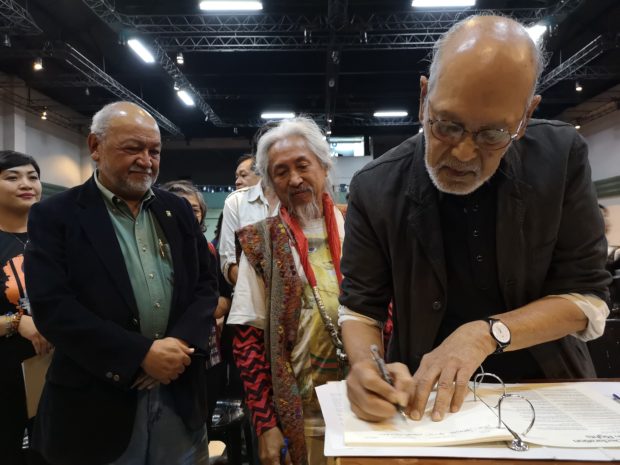Baguio artists unite vs drug killings

Credit to Author: besguerra| Date: Sun, 10 Feb 2019 23:23:56 +0000
BAGUIO CITY — Actor Mae Paner, better known as Juana Change, delivered a compelling performance of the monologues “Tao Po” that was greeted with a standing ovation at the University of the Cordilleras (UC) Theater on Saturday.
Paner’s moving portrayals of a photojournalist, inspired by the work and life of former Inquirer photographer Raffy Lerma, a Zumba instructor whose husband and son were killed by masked men as they pleaded on their knees for their lives, a hired killer slowly growing a conscience, and a child orphaned of parents, friends and neighbors, all victims of extrajudicial killings (EJKs), served as a mirror to the violence and injustice going on in society.
Running for an hour and 20 minutes, the monologues, penned by Maynard Manansala based on real-life stories and directed by Ed Lacson Jr., drew a capacity audience of 900 plus, the most number in any “Tao Po” staging since it premiered in Manila in 2017.
Artists’ statement
The Baguio audience — especially its cultural workers led by National Artists Ben Cabrera and Eric de Guia (Kidlat Tahimik), community paper editor Kathleen Okubo and theater stalwart Karlo Altomonte — united afterward to sign the Manifesto of Artists for Human Rights.
The statement expressed the artists’ and citizens’ refusal “to stay silent in the face of wrongdoings,” their commitment to a “creative practice that pierces through the rhetoric of those in power and reflects the true conditions of society.”
In the words of Lerma, “I cannot turn a blind eye to what is staring me in the face.”
That’s EJKs—the almost nightly killings of mostly poor drug users and alleged pushers by police or motorcycle-riding gunmen in President Duterte’s war on drugs.
The campaign has taken the lives of nearly 5,000 people—rights groups cite higher figures, some reaching as high as 20,000—since Mr. Duterte launched his centerpiece program right after taking office in 2016.
The program has drawn condemnation from human rights organizations, expressions of concern from Western governments, and warnings of potential crime against humanity from the International Criminal Court.
Call of the times
At the panel discussion after the play’s staging, Altomonte congratulated the “Tao Po” team for answering the call of the times.
He stressed how important it was “to call out a wrong when it is done, to acknowledge a right deed also when it’s done.”
“Sometimes, even if you just cross the street at the proper crossing, that in itself is heroic,” he added.
The play, Lerma said, sought to reiterate that there is a solution to the drug menace, and it does not have to be killing the addicts.
Dangerous times
He said the real reasons behind the drug problem—which he called a health, not a criminal, issue—were poverty and lack of education.
Ray Dean Salvosa, UC president, agreed that “we live in dangerous times when even our core values are under attack. We live under an administration that has made ‘human rights’ a bad phrase.”
He said he was appalled that the EJK figures had reached 17,000, saying “in the 14 years of martial law [under Ferdinand] Marcos, we didn’t have that body count.”
As a tribute to Paner, Salvosa quoted the South African antiapartheid activist Steve Biko: “The issue is not human rights. It is human wrongs.”
He added that as a student and teacher of history, he was “worried about the desensitization of our people” to the killings of drug addicts.
The authorities, he said, should be running after big-time drug pushers instead.
Salvosa likened the country’s situation to the patterns leading to the Holocaust when people were being “desensitized as the Germans in Nazi Germany.”
According to him, some educated people like businessmen and teachers openly say, “Tama lang, patayin ang mga ’yan (That’s right, kill them all).”
Salvosa found this ironic because it is happening in the only Catholic country in Asia where some people are clamoring for the reinstatement of the death penalty and the lowering of the age of criminal responsibility to 9.
Because many people were turned away from the theater since it was filled to capacity, “Tao Po” will have two repeat performances at the UC Theater in April, Salvosa said.